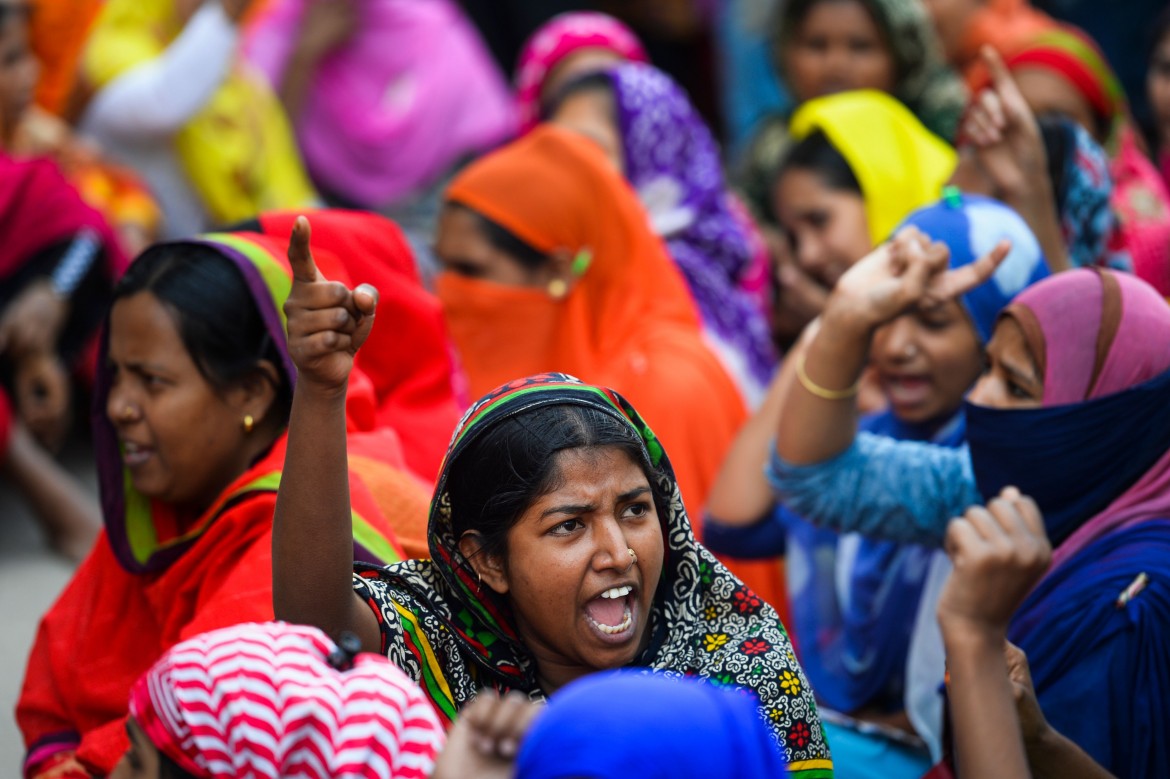Reportage
Big brands, poverty wages: textile workers are rising up in Bangladesh
For the past five days, the working men and women who manufacture cheap garments for Western clothing companies have been blocking the streets.

In the immense exhibition area of the International Convention City in Bashundara, government representatives and businessmen in power suits could be seen crowding the booths at the sixteenth edition of the DTG, the most important trade fair for textile machinery in the world, featuring 1,600 booths and 1,200 exhibitors from 37 countries. Meanwhile, a few kilometers away, in the Shewrapara district, as well as further north in the “industrial belt” of Mirpur, Savar and Ashulia, thousands upon thousands of textile workers, all wearing sandals, have put up roadblocks in protest.
This is Dhaka, the crowded capital of Bangladesh, which is a small patch of land inhabited by 160 million people overlooking the Bay of Bengal. At least 4 million work in the textile industry, which is second only to China on a global level in terms of trade volume: €26 billion each year, 80 percent of all of Bangladesh’s foreign trade. The fact that the country’s GDP is growing at a rate of 7.8 percent per year is, at least in part, thanks to these workers. They produce and package low-cost clothes for the large international chains—H&M, Walmart, Tesco, Aldi and others—but they themselves are not seeing much of the wealth they are generating.
Ever since Sunday, Jan. 6, a large number of these workers have blocked the streets and squares in the capital and northern suburbs of Dhaka. It’s hard to estimate how many there are, but if we add up the people present at the sites of the various roadblocks, we reach a figure into the tens of thousands of people, with hundreds of textile companies shuttered. The protesters are calling for more equitable pay and better working conditions.

There were some protests already in the days before the crucial national elections on Dec. 30, but they had faded from attention, overshadowed by the political tension between the Awami League, the party led by the incumbent Prime Minister, Sheikh Hasina, and the United National Front, also known as the Jatiya Oikya Front, which brought together a dozen parties around the Bangladesh Nationalist Party, the main opposition party, which had boycotted the previous elections in January 2014. Now, after the elections, the high tensions remain: according to the official results, the Awami League won 288 of 300 seats and Sheikh Hasina won a third consecutive term, while the opposition and the few international observers have been crying fraud and denouncing voter intimidation, arbitrary arrests are taking place and a climate of fear reigns. The worker’s protests have revived, but they are being addressed by those in power in the usual manner: straight-up repression.
The police have been using strong-arm tactics: batons, tear gas, rubber bullets. Dozens have been wounded, and one protester is dead: Sumon Miah, 22, killed on Tuesday during a demonstration in Savar. On Wednesday, some of the prominent unions—the Garment Sramik Odhilkar Andolon (GSAO) and the Garment Sramik Trade Union Kendra (GSTUK)—organized sit-ins demanding that the truth come out regarding Sumon Miah’s death, for which they are accusing the police. Other workers are still manning the roadblocks, demanding what they have been calling for from the beginning: fairer wages.
The social unrest arose from the beginning of December, because of the new government guidelines, decided in September by a special commission that meets every five years, regarding the minimum monthly wage, which was set at around €85 (around $100). For some workers—a small minority, the unions are saying—this represents a real increase, while for others—especially those with greater job seniority—it is the opposite: their pay has been cut. Furthermore, the wages for overtime have decreased as well. To top it all, many hundreds of workers have been unfairly dismissed simply because they claimed their rights. The unfair salary disparities have been recognized even by the new tripartite commission—made up of representatives of the government, businesses and unions—hastily set up by the government on Wednesday in order to get the conflict under control. “We are doing serious work to reduce wage disparities for some categories of workers,” said Afroza Khan, the Minister of Labor, striking a conciliatory tone. The government’s representatives say that a solution can be found in a matter of days. The Transport Minister, Obaidul Quader, has ordered that all roadblocks be removed within a week—but the trade unions are saying that until they receive strong assurances regarding their demands, the workers will keep protesting.
Meanwhile, in Bushandara, the DTG textile machinery fair ended on Saturday. Its 40,000 attendees are an impressive number—but the workers who have gone on strike are even more.

Originally published at https://ilmanifesto.it/bangladesh-grandi-marchi-e-piccoli-salari-rivolta-operaia-nel-tessile/ on 2019-01-12
